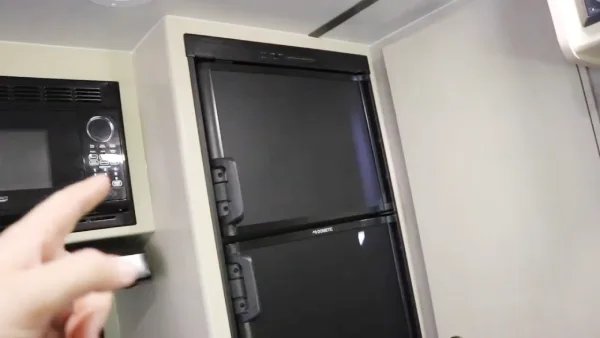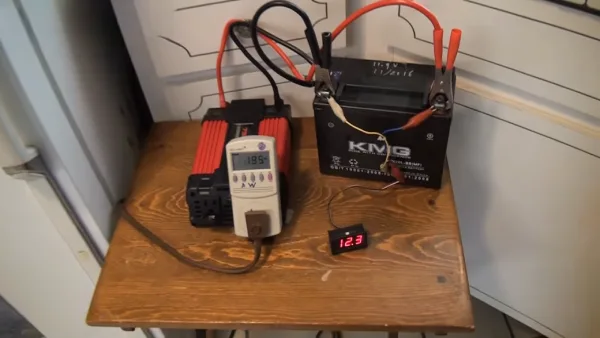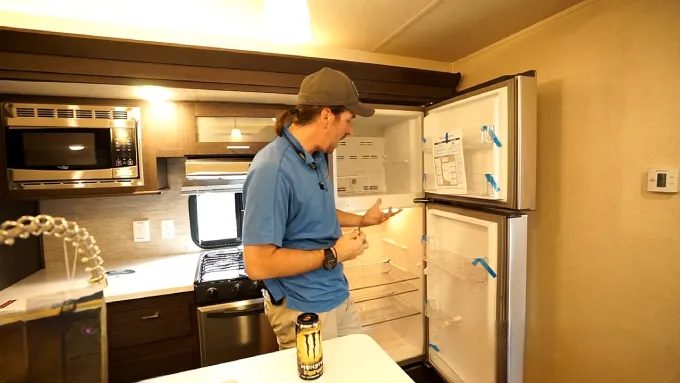Last Updated on July 10, 2023
Keeping your food fresh and chilled is a top priority when you take your RV out for a few days or weeks. But how long can your residential fridge run on battery power?
A residential RV fridge lets you keep your food cool for up to 12 hours when on battery power. For those with absorption fridges, though, the window of time is considerably shorter “just 3-4 hours“. If you want longer-lasting chillin’ times, consider combining batteries and propane as an energy solution.
Let’s go over how to run a residential fridge on battery power in an RV. Get ready to learn everything you need to know about keeping your food fresh outdoors.
How Long Will An RV Residential Fridge Run On Battery: Calculation System

The time it will take your RV fridge to run on the battery is essential for planning and managing your power consumption while on the road. A fridge’s ability to run off a battery depends on several factors, including the battery capacity, energy draw of the fridge, temperature settings, and frequency of use.
You have to know how much energy your fridge consumes every day in Ah to calculate how long it will run on battery. For example, if you have a 100 Ah battery and your fridge consumes 50 Ah per day, it will run for approximately two days before recharging.
Here’s a quick formula to help you calculate your RV fridge’s battery life:
Battery Capacity (in Ah) / Daily Energy Consumption (in Ah) = Number of Days Before Recharge
It’s important to note that this calculation is based on average energy consumption and may vary depending on other factors such as temperature settings and frequency of use.
To get a more accurate estimate, you can also measure your RV fridge’s energy consumption using an ammeter. This device measures the flow of electric current in amps and can help you determine how much power your fridge consumes.
Along with figuring out how long your RV fridge will last on batteries, you should also think about ways to extend its life. Keep the temperature settings moderate rather than running it at max all the time. It’s also a good idea to minimize opening and closing your refrigerator door.
The Factors That Affect How Long an RV Fridge Runs on Batteries
Battery-powered RV fridges can run for a long time before draining the battery depending on several factors. Understanding these factors is essential for ensuring you have enough power to keep your food and drinks cold while on the road.
Battery Capacity
Battery capacity is one of the most important factors that determine how long an RV refrigerator runs on batteries. The larger the battery capacity, the longer the fridge will be able to operate without needing a recharge.
Most RVs come equipped with deep-cycle batteries designed to provide sustained power over an extended period. These batteries are different from standard car batteries, which are designed to deliver short bursts of high energy for starting an engine.
Deep cycle batteries can discharge up to 80% of their total capacity without damage, making them ideal for powering appliances like RV fridges.
When it comes to battery capacity, bigger is generally better. A larger battery bank will provide more power and allow you to run your fridge for a longer period of time before needing a recharge. However, it’s important to note that adding more batteries will also increase the weight and cost of your system.
When deciding how much battery capacity you need for your RV fridge, you’ll need to consider a few things, like the size, energy draw, and overall power consumption. You should consult with a professional before making any major modifications or upgrades to your RV’s electrical system.
Energy Draw of the Fridge
The energy draw of the fridge is one of the most critical factors that affect RV residential fridge battery power. The energy draw, also known as power consumption, is the amount of electricity that the fridge uses per hour.
RV fridges come in different sizes and models, and each has a different energy draw. Typically, larger fridges with more features use more power than smaller ones. For instance, a 10-cubic-foot fridge will have a lower energy draw than a 20-cubic-foot model.
The energy draw of an RV fridge depends on several factors, such as its age, efficiency rating, and whether it has an automatic defrost feature or not. Newer models with higher efficiency ratings tend to use less power than older ones.
To determine the energy draw of your RV fridge, you can check its manual or look for a label inside the fridge that indicates its wattage or amperage rating. Most RV fridges require between 2 and 4 amps to run continuously.
It’s important to note that other appliances and devices in your RV may also be drawing power from the same battery system as your fridge. This means that if you have multiple devices running at once, your battery will drain faster and your fridge may not run for as long.
Temperature Settings
Temperature settings can significantly impact RV fridge battery life. The fridge’s temperature affects the unit’s energy draw, meaning that a lower temperature setting will use more energy and drain your battery faster.
For example, if you set your RV fridge to 32°F, it will use more energy to maintain that temperature compared to if you set it to 40°F. If you want your battery to last longer, you should consider setting your fridge temperature a few degrees higher than what you might be used to at home.
Another factor to consider is the ambient temperature outside of the RV. If it’s hot outside, the fridge must work harder to maintain a lower temperature inside. This means that in hotter climates, you may need to adjust your fridge temperature even higher than normal to conserve battery power.
It’s also important to note that some RV fridges are designed with multiple compartments or zones with different temperature settings. If this is the case for your fridge, only use the compartments you need and set them at appropriate temperatures based on what you’re storing.
Frequency of Use
The frequency of use is an important factor to consider when determining how long an RV residential fridge will run on battery. The more often the fridge is opened and closed, the shorter the battery life will be. The fridge has to work harder to maintain its temperature when its door is opened.
For example, if you’re constantly opening and closing your fridge throughout the day to grab snacks or drinks, it will drain your battery much faster than if you only open it a few times a day. In addition, leaving the fridge open for extended periods can also significantly decrease battery life.
To conserve power and prolong the lifespan of your RV fridge’s battery, it’s important to minimize the frequency of use as much as possible. One way to do this is by planning ahead and taking out everything you need at once instead of repeatedly opening and closing the door.
Tips for Extending the Life of Your RV Fridge’s Battery

One of the biggest concerns for RV owners is how long their fridges will last on battery. Luckily, there are several tips you can follow to extend your RV fridge’s battery life.
Firstly, consider investing in solar panels. Solar panels are a great way to make your RV fridge last longer as they convert sunlight into energy that can be used to power your appliances. By using solar panels, you won’t have to rely solely on your RV’s battery to keep your fridge running.
Your RV fridge’s battery can also be extended by keeping it well-maintained. Regular maintenance will ensure that your fridge is running efficiently and not drawing more power than necessary. This includes cleaning the coils and ensuring tight seals around the doors.
Additionally, try to limit opening and closing the fridge door as much as possible. When you open the door, cold air escapes and warm air enters, so your fridge must work harder to maintain its temperature. Limiting how often you open and close the door will reduce the power needed to keep your food cold.
You should also consider using a cooler for items that don’t need refrigeration, such as drinks or snacks. This will reduce the amount of space needed in your fridge and therefore reduce its energy draw.
Finally, make sure that you’re using energy-efficient appliances throughout your RV. This includes LED lights and low-energy use electronics. The less energy you use overall, the longer your RV fridge’s battery will last.
How Long Will a 100 Amp Hour Battery Run a Refrigerator?
Assuming that your refrigerator draws 4 amps of current and runs for 50% of the time, we can now calculate how long a 100 amp hour battery will run your refrigerator. To do this, we need to convert the amp hours to watt-hours as follows:
100 Ah x 12 volts = 1200 Wh
Now, let’s consider the power consumption of your fridge. Assuming it runs for 12 hours a day, the total power consumption would be:
4 amps x 12 volts x 12 hours = 576 Wh
Therefore, a 100 Ah battery would be able to run your fridge for:
1200 Wh ÷ 576 Wh = 2.08 days or approximately 50 hours
Of course, this calculation assumes that the battery is fully charged and that there are no other significant drains on the battery during this time. It is also worth noting that the life of your battery may be affected by factors such as temperature, age, and usage patterns.
Can You Leave a Battery-Powered RV Fridge On All the Time?
Leaving your battery-powered RV fridge running all the time is not recommended. While it may seem convenient to keep your fridge running continuously to avoid spoilage, doing so can actually damage your RV’s battery.
Most RV refrigerators require periodic cycling off and thawing to prevent this type of damage. Leaving your fridge on continuously can cause your battery to overcharge, which can shorten its overall lifespan and even render it useless in the long run.
To avoid damaging your RV’s battery and ensure that your fridge remains in good working order, it is important to follow manufacturer recommendations and cycle your refrigerator as needed. Invest in a battery monitor or controller to prevent overcharging and regulate your RV battery’s charge.
Unlock the Mystery of Refrigerator Longevity: RV Residential Fridges
The truth is that no single answer applies to everyone regarding RV residential fridge lifespan. Criteria like battery power, consumption rate, temperature settings and how often you use your fridge all interact in complex ways that affect the longevity of its run time on a battery.
Those who understand these basic principles can extend the life of their fridges by using solar panels or generators and keeping the fridge full to make it more efficient. Off-grid RV owners can maximize their fridge’s battery life and travel comfortably and conveniently with some strategic planning and smart choices.



